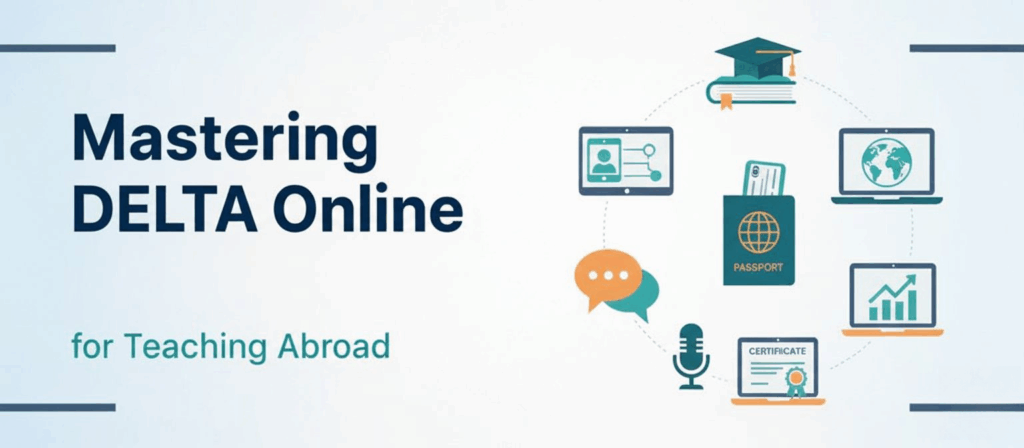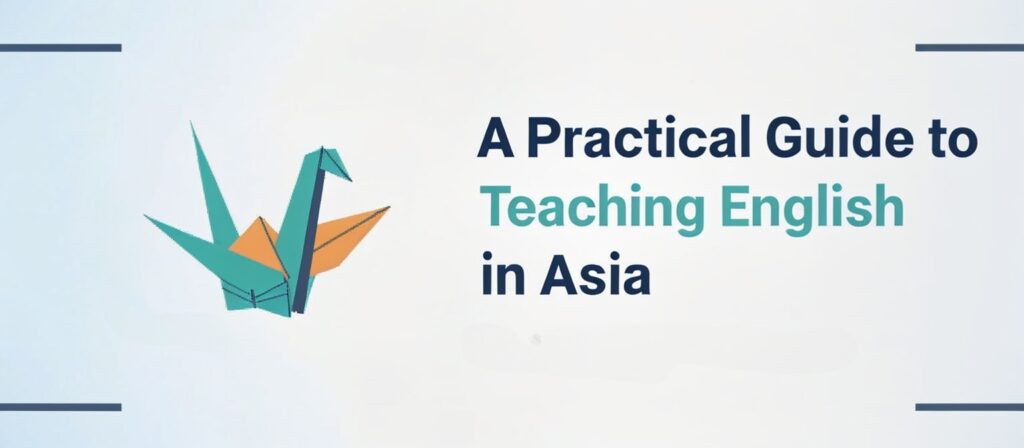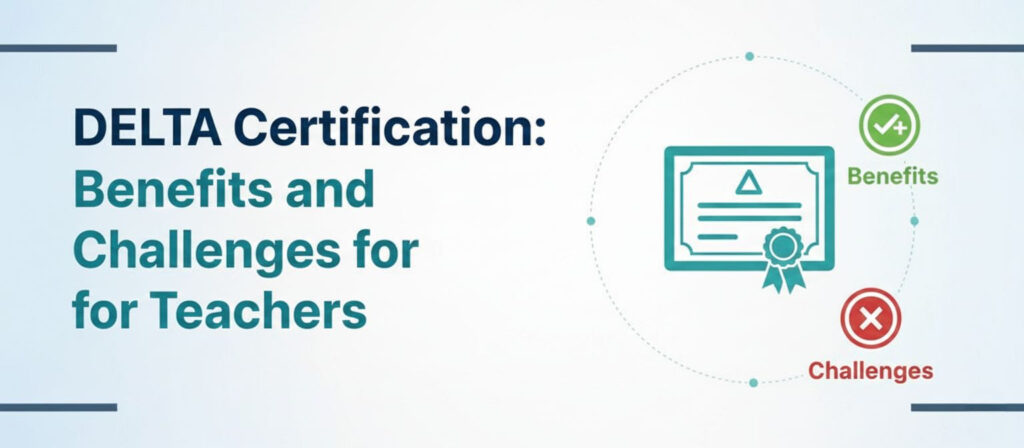Understanding the DELTA Online Course: Pathways to Teaching Abroad

Embarking on the DELTA Online course is a decisive step for teachers aspiring to work abroad or secure higher-level positions in ESL contexts. Many find that balancing rigorous academic work with the realities of teaching abroad, where opportunities demand both sound theory and adaptable practice, can be a challenge. This article will walk you through the structure, preparation, assessment practices, and global value of DELTA when pursued online, helping you translate study into meaningful international teaching roles.
Understanding the DELTA Online Course Structure and Benefits
DELTA Online is designed to combine rigorous theoretical study with practical teaching development, delivered through flexible, tutor-supported formats. Learners engage with core concepts in language awareness, pedagogy, and reflective practice, then apply those insights in real classrooms or simulated settings. The online delivery model recognizes the realities of busy teachers-time zones, work commitments, and travel plans-without compromising the depth and rigour expected of a Diploma.
Table: DELTA Online Course Components
| Component | Description | Delivery/Mode | Example Tasks |
| Module 1 | Understanding Language, Methodology and Practice | Online lectures, reading, discussion forums | Analytical essays, methodology comparisons, language awareness activities |
| Module 2 | Developing Professional Practice | Practical teaching tasks, observation, feedback cycles | Teaching journal, micro-teach sessions, peer feedback |
| Module 3 | Option/Specialism (e.g. ESP, YL, EAP) | Independent research or extended project | Case study, needs analysis, action research proposal |
DELTA Online has international credibility. Since the Diploma is awarded by Cambridge Assessment English, it’s known and respected by international schools, universities, and examination boards worldwide. The online format supports a range of timetables, enabling teachers to study while continuing classroom or online teaching duties.
Importantly, online DELTA places an emphasis on evidence-based practice: your assignments and teaching tasks are targeted to show observable impact on learner outcomes, not just theoretical knowledge. For many educators, this alignment with professional standards makes DELTA a meaningful and career-enhancing credential, whatever their teaching context.
Besides the certificate itself, such topics as language awareness, learner-centered pedagogy, assessment literacy, and reflective practice are skills that transfer directly to effective planning, delivery, and evaluation in unfamiliar classrooms. Online DELTA also fosters professional networks across regions, allowing teachers to share case studies, resource ideas, and feedback strategies with peers perhaps working in very different contexts. This is a key advantage for those planning to teach abroad, where cultural and instructional diversity demands adaptable and well-informed practice.
Preparing for Teaching Abroad Through DELTA Success
Preparation for DELTA Online begins long before you actually start the modules. Prospective candidates should:
- Audit their teaching experience.
- Identify areas for growth.
- Align DELTA choices with intended destinations or school types.
For many teachers, this means choosing an optional Module 3 focus that complements their target context, such as EAP for university settings or YL for language schools hosting younger cohorts. Early clarity about goals helps shape a realistic study plan, and in turn, makes sure the work you produce is directly transferable to international classrooms.
Your preparation also benefits from building a robust teaching portfolio. Gather lesson plans, student feedback, and teaching observations that illustrate your instructional trajectory. These artefacts not only support Module 2’s development tasks but also provide tangible evidence for potential employers abroad.
In addition, setting up a dedicated study schedule, which would block out specific time each week for reading, assignments, and teaching practice, reduces stress and keeps you on track across months of study. And finally, it allows for the understanding of the expectations from both visa agencies and employers in your target region to enable you to tailor your DELTA journey to meet those standards, emphasizing practical classroom impact alongside theoretical understanding.
Another preparation lever is exposure to diverse teaching contexts. If you cannot travel yet, use online teaching communities, participate in moderated peer observations, and analyze classroom scenarios from a range of cultures. This preparatory work makes your DELTA performance more robust when you begin teaching abroad, because you have already confronted a spectrum of learner profiles, classroom norms, and assessment expectations. Remember, the DELTA is not just a certificate but a professional development process that strengthens your adaptability, assessment literacy, and reflective practice-all highly valued qualities of an international school or language center professional.
Assessments, Feedback, and Practical DELTA Strategies
Assessments in DELTA Online are designed to evaluate both understanding and professional application of that knowledge. You will find:
- Written assignments.
- Reflective journals.
- Lesson observations.
- Possibly a research component (depending on the module taken).
The emphasis is on clear, evidence-based outcomes-how your teaching impacts learner progress, how you adapt to diverse contexts, and how you synthesize theory with practice. Feedback from tutors and peers is integral in the learning cycle as it refines strategies and demonstrates growth over time.
Effective DELTA strategies combine structured study with iterative practice. Micro-teaching, paired teaching, and video analyses are common tools that help you scrutinize your instructional choices and their effects on learners. Keeping a reflective log is a practical habit; it supports the development of professional language to describe approaches, justify decisions, and articulate next steps.
Constructive feedback is most valued when you translate it into concrete plans for improvement, such as adjusting task design, scaffolding, or assessment criteria in subsequent lessons. In an online environment, well-organized submission schedules and timely responses from tutors help sustain momentum and deepen learning across modules.
A practical DELTA strategy is to simulate the full cycle of lesson planning, implementation, observation, and feedback within a safe, supportive setting. Plan a lesson, record it where possible, and solicit feedback from a mentor or fellow teachers before re-teaching with adjustments. Pair this with a formal action research short project in Module 3 to investigate a teaching hypothesis you’re pursuing, providing a credible bridge between classroom practice and scholarly reflection. By foregrounding impact-what learners can do differently after your instruction-you’ll gather compelling evidence for both the assessment tasks and future employment abroad.
Gaining Global Credentials: The DELTA Online Path
Gaining an online DELTA indicates long-term dedication to professional development and the ability to perform well across a range of ESL contexts. Many regions hold this credential in high regard, including Europe, the Middle East, Asia, and the Americas.
Employers respect it because DELTA requires:
- Evidence of actual impact.
- Systematic reflection.
- The ability to adapt materials and methodologies to diverse learner populations.
Global applicability is what makes DELTA Online an attractive option for teachers looking to work internationally, as course structure and assessment criteria are focused on classroom outcomes.
The DELTA Online route is flexible, yet rigorous: you can study in your own time within the agreed timeframes set by the provider, subject, of course, to meeting assignment deadlines and attendance at sessions where you receive tutor feedback. This balance is particularly attractive for teachers already working abroad or those who travel a lot since it means that their professional development need not be placed on hold for several months. The result is not just a certificate but also a clear record of how you have enhanced learner engagement, improved assessment practices, and strengthened classroom management within diverse contexts.
DELTA Online versus On-Campus: Flexibility, Access, and Planning
Online DELTA offers unparalleled flexibility for busy teachers with ambitions to work abroad. You will have access to lectures, readings, and assignments from anywhere with an internet connection to integrate study with ongoing teaching responsibilities. However, this online environment places a premium on self-discipline, effective time management, and proactive engagement with tutors and peers.
Some will find advantages in a campus environment: live integrated teaching practice, face-to-face feedback, and immediate collegial collaboration translate into faster progression through modules. On-campus DELTA experiences, in contrast, offer immersive environments that have the potential to fast-track aspects of learning, particularly practical components and networking opportunities.
The personal circumstances, learning preference, and long-term goals often determine whether one selects to enroll for an online or on-campus format. A blended approach, which combines online modules with intermittent in-person teaching sessions or workshops, can deliver the benefits of both formats. When planning your DELTA journey, map your destination to the format that best supports your professional aims and the country or institution where you hope to teach.
Planning for DELTA Online also involves budgeting time, tuition, and study resources. Be sure to compare total costs, access to local study groups, and levels of tutor support. While online courses save time and money on travel and time away from work, they demand discipline if you are to avoid falling behind. Organize your study space, establish boundaries around teaching schedules, and establish a routine that matches the discipline you expect in a future international classroom. With careful planning, DELTA Online can be a powerful stepping stone to teaching abroad while maintaining ongoing teaching commitments.
Practical Study Habits for DELTA Online: Time, Balance, and Resources
Successful DELTA Online study depends upon deliberate habits, which translate into measurable classroom impact. Start with a realistic timetable that allocates regular, focused study blocks each week, time for reading, writing, reflection, and teaching practice. Block out deadlines for modules and assignments, and build in buffers for feedback cycles. Establishing a routine reduces last-minute pressure and helps you sustain progress through busy teaching periods or travel plans.
Active study techniques work better than merely reading. Engage with the module content through:
- Annotating texts.
- Summarizing key ideas using your own words.
- Testing concepts through practice lesson plans.
Practice teaching with a partner or mentor; record performances where possible and review the footage for precise areas of improvement. Finally, cultivate a small, supportive community, online or locally, in which to share resources, exchange feedback, and keep motivated throughout the DELTA journey.
Is DELTA Online equivalent in status to on-campus DELTA?
Yes. DELTA is a internationally recognised Diploma in Teaching English to Speakers of Other Languages, and online delivery maintains the same academic standards and assessment expectations as on-campus formats. The key difference lies in scheduling flexibility and access to resources, not in credential quality.
How long does DELTA Online typically take?
Duration varies by provider and study plan, but most learners complete within six to twelve months, depending on module selection, teaching commitments, and pace. It is important to set realistic weekly workloads and meet submission deadlines to avoid overload.
What kind of support can I expect in DELTA Online?
Expect tutor feedback, peer collaboration, online forums, and structured assignment guidance. Most courses offer scheduled tutorial sessions and opportunities for synchronous or asynchronous discussion to deepen understanding and practice.
Can I apply DELTA online if I’m currently teaching abroad?
Absolutely. DELTA Online is designed for working teachers, with flexible access to materials and assignments. It is common for candidates to balance teaching duties with online study, using reflective practice to enhance classroom outcomes.
How can I maximise my DELTA online experience?
Start by clarifying your teaching goals, choose an Module 3 focus that aligns with your target contexts, create a consistent study routine, actively seek feedback, and document your practice with reflections and artefacts that demonstrate impact.






